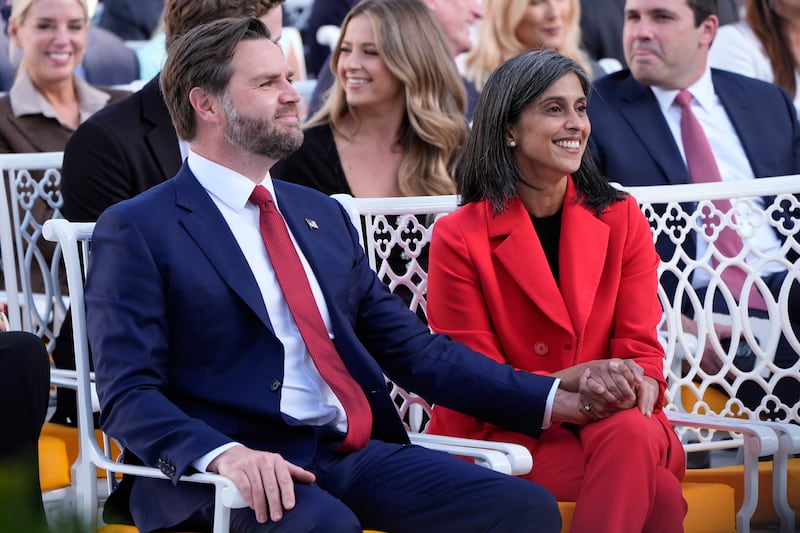JD Vance’s wife Usha Vance has no plans to convert to Christianity, the vice president clarified after his comments about his interfaith marriage drew attention at a Turning Point USA event at the University of Mississippi in Oxford on Wednesday, Oct. 29.
He does, however, hope she may one day “see things as I do” when it comes to his Christian Catholic faith, he said.
“My wife is the most amazing blessing I have in my life,” Vance, who is a convert to the Catholic faith, wrote on X on Friday. “She herself encouraged me to reengage with my faith many years ago. She is not a Christian and has no plans to convert, but like many people in an interfaith marriage — or any interfaith relationship — I hope she may one day see things as I do. Regardless, I’ll continue to love and support her and talk to her about faith and life and everything else, because she’s my wife.”
Earlier in the week, Vance took questions at the Turning Point USA event, similar to how the organization’s founder, Charlie Kirk, did before his assassination in September. An audience member, who admitted she was not Christian, asked Vance about navigating parenting in an interfaith marriage: “How are you teaching your kids not to keep your religion ahead of their mother’s religion?”
The question also touched on immigration and the perception of Christianity as a dominant national religion: “Why are we making Christianity one of the major things that you have to have in common to be one of you guys, to show that I love America just as you do?”
Vance explained that Usha grew up in a Hindu family, and when they met, he considered himself “an agnostic or an atheist” and that she felt similarly about faith.
“Everybody has to come to their own arrangement here,” he said. “The way we’ve come to our arrangement is she’s my best friend. We talk to each other about this stuff.”
Nearly 26% of American couples are currently in interfaith marriages, according to the latest Pew Research Center Religious Landscape Study, while 74% of married adults identify with the same religion as their spouse. The study found that 13% of adults are Christians and are married to a religiously unaffiliated person and 7% of Americans are married to a person of another Christian denomination. JD and Usha Vance are among 6% of married Americans who are in interfaith marriages when one spouse may be a Christian and the other is not.
In his comments, Vance also added that they decided to raise their three children Christian. Their two oldest attend a Christian school, and their 8-year-old recently received his first communion.
Vance emphasized that open conversation is key in interfaith marriages, whether between Protestant and Catholic spouses or atheist and Christian couples.
“The only advice I can give is you just have to talk to the person God has put you with and make those decisions as a family unit,” he said.
Vance also shared that while he hopes Usha may one day embrace the Catholic faith, he respects her choice. “Do I hope eventually that she is somehow moved by the same thing that I was moved by in church? Yeah, I honestly do wish that.”
Most Sundays, Usha attends Catholic services with Vance and maintains a close relationship with the priest who baptized him, although Vance had said before he occasionally “feels bad” for bringing her and the kids to mass every week.
“If she doesn’t see things the same way, that’s OK. God says everybody has free will, and so that doesn’t cause problems for me,” he said at the event.
His comments sparked both backlash and outpouring of support online. “The concern is that you publicly downplayed your wife’s Hindu identity to appease a political base uncomfortable with it,” one commenter said.
The sentiment that being a Christian is inseparable from the desire to share it was echoed across more supportive comments.
“If you believe that Christ is the road to salvation, naturally you want your wife to find Christ,” according to Washington Post columnist Megan McArdle.
Some believed he should have declined to answer the question. “But we’ve lost our sense of boundaries, as it’s become a cultural norm to share private matters publicly,” wrote attorney Laura Powell on X.
He added in his post on X that some of the backlash to his comments veered into “anti-Christian bigotry.” “Yes, Christians have beliefs,” he said. “And yes, those beliefs have many consequences, one of which is that we want to share them with other people.”
In the United States, about a quarter of Hindus and Catholics marry outside their faith, according to Dilip Amin, founder of Interfaith Shaadi, a nonprofit that offers resources for interfaith relationships.
Catholicism teaches that salvation comes exclusively through Jesus Christ, he wrote in a post on Patheos, while Hinduism is pluralistic, allowing multiple paths to spiritual liberation (moksha) without requiring devotion to a specific deity or institution.
“Both Hinduism and Catholicism are profound, deeply rooted traditions. Marriage between adherents of these faiths requires honest, informed decision-making — not just efforts to please families or religious institutions,“ Amin wrote. ”On certain issues, such as after-death rites or child-rearing practices, compromise may not be possible.”


